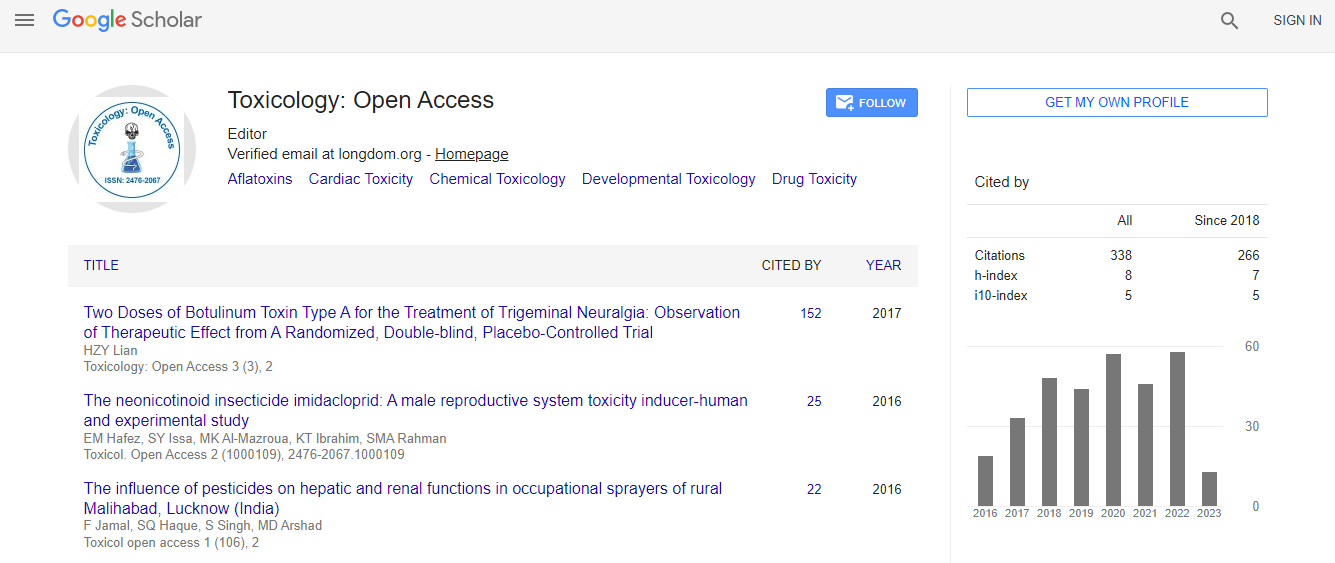Our Group organises 3000+ Global Conferenceseries Events every year across USA, Europe & Asia with support from 1000 more scientific Societies and Publishes 700+ Open Access Journals which contains over 50000 eminent personalities, reputed scientists as editorial board members.
Open Access Journals gaining more Readers and Citations
700 Journals and 15,000,000 Readers Each Journal is getting 25,000+ Readers
Google Scholar citation report
Citations : 336
Toxicology: Open Access received 336 citations as per Google Scholar report
Indexed In
- Google Scholar
- RefSeek
- Hamdard University
- EBSCO A-Z
- Geneva Foundation for Medical Education and Research
- Euro Pub
- ICMJE
Useful Links
Related Subjects
Share This Page
Characterization, cytotoxicity and genotoxicity of landfill leachates: A comparative assessment between landfills throughout Lebanon
8th World Congress on Toxicology and Pharmacology
Christian Khalil, Rony Khnayzer and Cynthia El Hajjeh
Lebanese American University, Lebanon
ScientificTracks Abstracts: Toxicol Open Access
Abstract
Statement of the Problem: Lebanon has been witnessing a waste crisis in the last few years due to the closure of a main landfill in Naameh as it exceeded storage capacity. The municipal waste crisis was years in the making because of the absence of a clear national municipal waste minimization, recycling and disposal strategies with the preferred option being landfills throughout the country. The disposition of municipal, medical, industrial and all wastes into landfills helped in short term waste disposal but created a new challenge in the form of leachates. The purpose of this study was to assess the toxicological and health impacts of leachates exposure by investigating a number of regulated and unregulated landfills scattered throughout the country. Methodology & Theoretical Orientation: The study consisted of sampling leachates from numerous sites scattered throughout the country. Some of the leachates at some sites were subjected to biological treatment prior to disposal into the natural environment while in other sites they were disposed without any treatment. The leachates were collected by our team and subjected to chemical characterization using Gas Chromatography-Mass Spectrometry GC/MS and toxicological assessment using cytotoxicity and genotoxicity assays. Findings: The study indicated significant high concentrations of Cadmium, Chromium, Copper, Aluminum, Manganese, Potassium, Sodium Nickel and Calcium in comparison to a previous study undertaken on the municipal wastes in Lebanon and published data from worldwide landfills. The leachates also posed significant toxicological and genotoxicological risks as identified by the in vitro assays conducted using human derived cells. Conclusion & Significance: This study provided qualitative and quantitative knowledge of the volatile and semi-volatile compounds in leachates from numerous sites across Lebanon. Molecules related to cosmetics, medicines, pharmaceuticals, agri- food repellents, plastics were reported in the study. A significant toxic and genotoxic risks can be experimentally revealed by the identification of DEHA, Phthalic acid, mono-(2-ethylhexyl) ester and Tributylamine in untreated leachates dumped into the natural environment. Recommendations are made for biological treatment of leachates prior to disposal into the natural environment.Recent Publications :
√ʬ?¬Ę Khalil C (2015) In vitro UVB induced cellular damage assessment using primary human skin derived cells. MOJ Toxicology. 1 (4): 20√ʬ?¬ź 28.
√ʬ?¬Ę Y Siti Hajar, A Intasiri, C Winder and C Khalil (2013) In vitro cytotoxicity of mild steel and stainless steel welding fumes using human√ʬ?¬źderived cells. Health. 4 (2): 20√ʬ?¬ź36.
√ʬ?¬Ę Ghauri B, Manshaa M and Khalil C (2012) Characterization of cytotoxicity of airborne particulates from urban areas of Lahore. Journal of Environmental Sciences 24 (11): 2028√ʬ?¬?2034.
√ʬ?¬Ę Soni B, Visavadiya N P, Dalwadi N, Madamwar D, Winder C and Khalil C (2010) Purified c√ʬ?¬źphycoerythrin: Safety studies in rats and protective role against permanganate mediated fibroblast√ʬ?¬źDNA damage. Journal of Applied Toxicology. 30: 542√ʬ?¬?550.
Biography
Christian Khalil is a Professor of Environmental Toxicology. He is currently affiliated with Lebanese American University (LAU) in Lebanon. His other affiliations include the Faculty of Built Environment and Institute of Environmental Studies, at the University of New South Wales (UNSW), School of Business at Australian Catholic University (ACU) in Australia. He is also the Director of International Environmental Services (IES)- training and consulting organization based in Sydney, Australia. He has a proven record of research by leading a number of research projects in the environmental toxicology arena. He enjoys a strong experience in consulting government and industry on toxicological and pollution matters. He has numerous publications in his areas of interests like environmental toxicology, management systems, environmental sustainability, work health and safety (WHS) and environmental pollution.
Email: Christian.khalil@lau.edu.lb

 Spanish
Spanish  Chinese
Chinese  Russian
Russian  German
German  French
French  Japanese
Japanese  Portuguese
Portuguese  Hindi
Hindi 